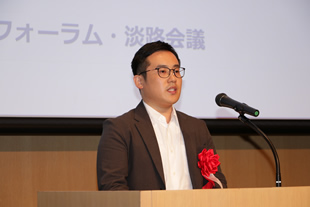 The 23rd Asia Pacific Research Prize - Commendation winner: Dr. Junyi Yang
The 23rd Asia Pacific Research Prize - Commendation winner: Dr. Junyi Yang
Title of Dissertation: “ Fisheries Knowledge Beyond the Sea: Fisheries Personnel and Their Activities in Modern China ”

- Dr. Junyi Yang
-
- Career -
Junyi Yang’s research interests mainly focus on relationship between Japan and China, maritime history, and history of fisheries education. Majoring in Human and Environmental Studies at the Graduate School of Human and Environmental Studies at Kyoto University, he obtained MA in 2018 and then PhD in 2022. Back in China, he joined the Department of History at Soochow University as an assistant professor. His first monograph, Fisheries Knowledge Beyond the Sea: The People Who Created the Ocean World of Modern East Asia has been published by Kyoto University Press in 2024.
- Summary -
In East Asia, Japan was the first nation that successfully promoted fisheries modernization, during which the Imperial Fisheries Institute under the Ministry of Agriculture and Commerce (today’s Tokyo University of Marine Science and Technology) played a significant role in it. Rather than just imitating the fisheries knowledge from Norway and other developed nations in Europe, the Imperial Fisheries Institute not only promoted fisheries education in terms of both the academic system and course subjects, but also reconstructed and widely disseminated Japan's fisheries knowledge.The fisheries knowledge discussed in this dissertation includes academic knowledge, as well as various fishery-related technologies and lifestyles, which were transmitted from Japan to China through Chinese students in Japan during the Late Qing Dynasty and early Republican China era. This dissertation examines how the Chinese government and fisheries personnel recognized the importance of the fishery industry and sought to incorporate knowledge and policies from Japan, ultimately applying these insights to China's fisheries education and industry.
This dissertation is composed of an introduction, five chapters, and a conclusion. The introduction analyzes how the Imperial Fisheries Institute under the Ministry of Agriculture and Commerce in Japan during the Meiji period trained fisheries personnel, how fisheries knowledge was spread from Japan to China, and the beginnings of fisheries education in China. Chapter one examines the history of the Zhili Fisheries Institute, the first fisheries school in China. Chapter two discusses how the Woosung fisheries college (today’s Shanghai Ocean University) nurtured fisheries personnel. Chapter three analyzes how fisheries personnel, who held important positions in Chinese government and became leaders in the fisheries industry, dealt with pirates in the 1930s. Chapter four pays special attention to how fisheries personnel attempt to rescue and educate fishermen. Chapter five examines both the revival of fisheries education and the fisheries issues in China between 1945 and 1949. The conclusion not only demonstrates the crucial role the fisheries knowledge from Japan played in East Asia, but also analyzes its impact on fisheries education in both Korea and Taiwan during the colonial period.
Adopting cross-disciplinary approaches in terms of the history of fishery, the history of Chinese students in Japan, and political history, this dissertation attempts to reveal how fisheries knowledge from Japan was disseminated, received and established in modern China.






